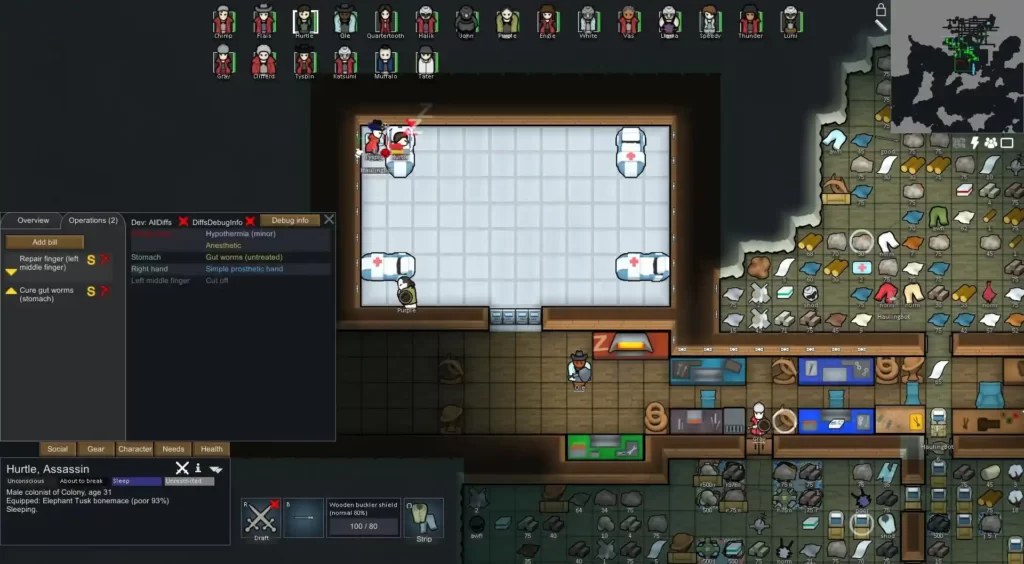Survival is crucial in the harsh and unpredictable realm of RimWorld. Disease is one of the biggest hazards to the health of your colonists and has the power to obliterate your population if unchecked. In this manual, we’ll dig into the vital techniques needed to thwart sickness and safeguard your colony from its fatal clutches.
It is crucial to comprehend how RimWorld’s health system functions. We’ll look at the many sorts of illnesses, how they spread, and the warning signs. With this information, you’ll be better prepared to identify and stop epidemics before they have a disastrous effect. Multifaceted illness management requires a multifaceted strategy. Here is our guide on How to disable disease in Rimworld.
How to disable disease in Rimworld?

RimWorld is a brutal and unexpected simulation game in which you are tasked with controlling the health of your colony in addition to creating and surviving in a harsh environment. One of the most difficult obstacles that your colonists will have to overcome is sickness, which is only one of the numerous hurdles they will confront.
Diseases may wreak havoc on your colony if they are allowed to spread uncontrolled, which can result in loss of life, hopelessness, and eventually the destruction of your carefully planned town. In this all-encompassing tutorial, we will go into the nitty-gritty details of controlling and eradicating illnesses in RimWorld.
This article will offer you the knowledge and methods necessary to keep your colonists healthy and prospering, regardless of whether you are an experienced player trying to develop your skills for illness prevention or a newbie seeking direction.
In light of the fact that we are now familiar with the inner workings of RimWorld’s infectious illnesses, it is time to investigate the most efficient methods for preventing and controlling sickness in your colony.
STEP 1: Establish a Medical Ward
The establishment of a specific medical ward inside your colony is one of the initial phases in the process of illness management. This area needs to be tidy, well-lit, and furnished with the required number of medical beds and pieces of equipment.
Appoint a competent member of the colony’s population to the role of primary physician, and make it their top priority to treat patients as quickly as possible.
In order to effectively treat diseases, it is essential to set up a medical ward that is both well-equipped and well-organized. Consider the following in addition to the obvious prerequisites of a tidy and well-lit environment:
Invest in hospital beds of the highest quality, along with vitals monitors and other pieces of medical equipment, in order to get the most out of the therapy. Patients’ overall rate of recovery sees a notable improvement as a result of these beds.
Although it is necessary to have one primary doctor, it is preferable to have numerous experienced physicians on your team. This will help guarantee that medical treatment is promptly available, which is especially important during major epidemics.
You should always have a supply of basic medical supplies on hand, such as medication, herbal medication, bandages, and glitterworld medicine. In times of crisis, this eliminates the risk of running out of supplies.
STEP 2: Prioritize Hygiene
The upkeep of cleanliness is of the utmost importance in illness prevention. You may encourage excellent hygiene practices among your colonists by designating spaces for washing hands and placing sterile tiles in the medical ward.
This will help prevent the spread of disease. In addition, make maintaining cleanliness a top priority in places used for food storage and preparation in order to avoid becoming sick from contaminated food.
Keeping a clean environment requires more than merely designating locations for washing up. Take into consideration the following extra measures of sanitation:
To lower the risk of infection among patients undergoing treatment or surgery in your medical ward, sterile tiles should be installed. In addition, the effectiveness of surgical procedures is improved by using these tiles.
Establish cleaning areas and delegate colonists to clean on a consistent basis. Pay special attention to high-traffic areas as well as any rooms that are used for food preparation or storage.
Take into consideration the use of hydroponic farms to produce food. This technique lowers the danger of infections that are transmitted via the soil, and it enables crop production all through the year.
STEP 3: Quarantine Zones
A dedicated quarantine area should be established for afflicted colonists as well as for arriving travelers who may be carrying diseases. This will help stop the spread of diseases. Make sure that your hospital ward and other locations that require quarantine have adequate ventilation and that they are well-isolated.
Both immunization and vaccination are available The development of vaccinations against prevalent illnesses can significantly shift the course of medical history. Establishing immunity for your colonists should be a top priority, thus making the production of vaccinations, particularly for illnesses that are pandemic, a top priority.
To lessen the likelihood of disease outbreaks, you should give vaccinations to every individual in your colony. As your colony expands, more sophisticated approaches to quarantine will become essential: Within the confines of your quarantine zone, designate certain rooms as zones for individual isolation.
These should each have their own medical beds and supplies to keep patients comfortable. Installing airlocks at the gates of quarantine zones is one method for preventing the introduction of airborne infections to other areas of your colony.
STEP 4: Medical Treatment
It is imperative that infected colonists receive timely medical care that is also appropriate. Assign knowledgeable medical professionals to provide care for patients and make use of medical beds, medication, and sterile bandages. Keep in mind that the quality of care is important, and as your colony expands, be sure to spend in updating your medical facilities and equipment.
In addition to the standard medical care, you might also want to investigate the following advanced medical strategies: Conduct research on and installation of various bionic components for the colonists. These can have a substantial positive impact on their general health and resilience, hence reducing their susceptibility to a variety of ailments.
When absolutely necessary, colonists should have organ transplants performed in order to preserve their lives. Replacement organs can sometimes be obtained by removing them from the bodies of adversaries after they have died.
STEP 5: Mood Management
It is more likely that a colonist will have a strong immune system if they are happy and pleased in their life. Maintaining the morale of your colonists should be a priority, so make sure to provide them with nice living quarters, entertaining activities, and all of their requirements. Maintaining a consistent mood can be beneficial to a person’s general health as well as their resistance to illness.
STEP 6: Prioritize Research
Invest as early as possible in research into medical technology and illness-preventive strategies. If you can create vaccinations as quickly as possible, you’ll be in a far better position to tackle any future epidemics. In addition, research into the development of new medical treatments and diagnostic technologies can be quite helpful.
STEP 7: Wildlife and Animal Management
Wild animals and domestic pets both have the potential to introduce illness into your colony. You should take steps to control the number of animals in your colony and guarantee that the people living there have as little interaction as possible with sick or diseased animals. Maintain a regular checkup schedule for your animals’ health and quarantine those that exhibit symptoms of the disease.
STEP 8: Visitor and Traveler Management
Maintain a keen awareness of any new guests or passers-by who arrive. Utilize the information panel to determine who among your colony members has a sickness, and if required, restrict their access to the colony until they have fully recovered.
It might be difficult to strike a balance between providing hospitality and preventing sickness, but doing so is absolutely necessary in order to safeguard your colonists.
STEP 9: Temperature Regulation
Keeping your colony’s temperature at the appropriate levels can also have an effect on how diseases are managed. The immune systems of your colonists may become compromised if they are exposed to temperatures that are either extremely hot or extremely cold. Make certain that your colony is equipped with sufficient heating and cooling equipment so that it can maintain a comfortable climate.
In conclusion, a multifaceted strategy that incorporates medical infrastructure, cleanliness, research, and proactive disease prevention is needed to manage and disable illnesses in RimWorld.
You can protect the well-being and prosperity of your RimWorld colony and transform it into a vibrant center of resiliency and success in the face of adversity by putting these cutting-edge ideas into practice and keeping a watchful attitude to illness prevention.
To secure the survival and welfare of your colonists, keep in mind that RimWorld is a dynamic and always changing game. As a result, you should adjust your strategy when new difficulties appear.
Follow us on Twitter & like our Facebook page for more post-updates.

An experienced gaming content writer who emphasizes on offering the most recent information and how-to tutorials for the trending titles. Being a Hardcore gamer himself, he likes to try an array of games and likes to spend his time exploring them. He likes to unwind by listening to R&B music when he’s not writing about gaming stuff.

